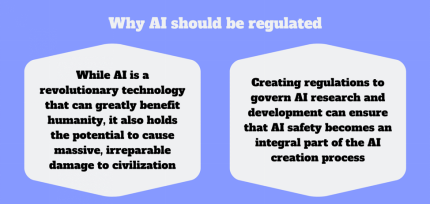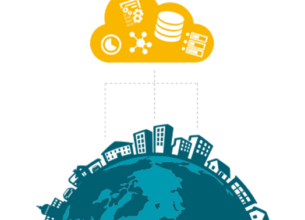REGULATING ARTIFICIAL INTELLIGENCE
24, Jan 2020

Prelims level : Robotics and Artificial Intelligence
Mains level : GS-III Awareness in the Field of IT, Space, Computers, Robotics, Nano-Technology, Bio-Technology and Issues relating to Intellectual Property Rights
Context:
- Recently, Sundar Pichai, the Chief Executive Officer of Google, has backed regulations for artificial intelligence. With Artificial intelligence progressing at a rapid pace and, infiltrating every sector, its growth poses significant challenges for both companies and the bodies that regulate them.
What is Artificial Intelligence?
- AI is the science of building computers that can solve problems the way humans do.
- It enables high level cognitive processes like thinking, perceiving, learning, problem solving and decision making.
- The AI works on the back of data collection and aggregation, analytics and computer processing.
- AI presents opportunities to complement and supplement human intelligence and enrich the way people live and work.
What are the Benefits of AI?
- For the governments AI can be a tool for governance, development and efficient decision making.
- Self-driving Cars, digital assistants (Alexa by Amazon), facial recognition are the major areas where the AI is used.
- AI is also used in healthcare systems, agriculture, manufacturing sector and transport sector.
- In the education sector, AI can assess students and adapt to their needs, helping them work at their own pace in their learning.
- AI technology development and applications are evolving rapidly with major implications for economies and societies.
How can the AI Benefit India?
- NITI Aayog estimates that adopting AI means a 15% boost for the gross value added (GVA) for the economy by 2035.
- AI can increase access and affordability of Quality
- In Agriculture,it can contribute towards enhancing farmers’ income, increase farm productivity and reduce wastage.
- It can also improve access and quality of
- It can help build efficient infrastructure for the increasing urban population.
- Develop smarter and safer modes of transportation to address traffic and congestion problems.
- AI could create jobs in the country that would be higher than the number of jobs becoming redundant due to innovation in Technology.
- Increase efficiency and Enhance Governance across the Government.
- Helps in improving the ease of doing business, as well as making the lives of people simpler
- ‘Make in India’ programme can be strengthened, and AI can help India in becoming a major manufacturing hub.
What are the Key challenges to adoption of AI in India?
- Lack of broad-based expertise in research and application of AI.
- Absence of access to intelligent data.
- High resource cost.
- Low awareness for Adoption of the Technology.
- Privacy and Security Issues.
- Shortage of skilled manpower.
- Indian technical universities are not doing enough to strengthen the AI ecosystem unlike their global counterparts.
Why do we need to Regulate AI?
- AI can be a double-edged sword – AI may be misused or behave in unpredicted and potentially harmful ways.Facial recognition – can be used for creating ‘deepfakes’, where a person in an existing image or video is replaced with someone else’s likeness using artificial neural networks. Safety, transparency and accountability – AI systems need new laws to fix accountability on the acts done by them.
- Ethical governance – AI systems need to be governed using ethical standards right from their phase of development, this can avoid prejudice in the coding of AI which may make the AI biased.
- Privacy concerns – Data collected by the AI systems shall affect the privacy of the concerned.

What are the steps required to Regulate AI?
- Data regulation – It is the precondition for setting up AI regulation. On the basis of protecting individual data rights, we ought to regulate and encourage data sharing and application, to better guide AI development.
- Designer regulation – We also need to think about who makes the algorithms for AI and through which procedures they code it. The experts who code the AI poses a real threat, if their personal bias is given to the AI during its process of development.
- Machine optimization rules – It must be sufficiently regulated and overseen, to ensure they are not abused. Without proper optimization, AI may be used to influence even a presidential election.
- The concepts such as transparency and open source should be included when establishing AI regulations.

How Governments are Beginning to regulate AI?
- While United States’ AI strategy focuses on self-regulation and rapid technological development, the others including China, the UK and the European Union have taken a government-led approach to defining AI principles.
- China has been at the forefront of creating an aggressive national push for AI development. For which, it is soliciting submissions from AI experts to develop its own governance principles.
- The UK is pioneering an ethical approach by the development of the Centre for Data Ethics and Innovation, and the Office for AI.
- Singapore’s government proposed an AI governance framework in the lines of “human-centric” approach.
- India sees AI as a means to a very specific end: solving the country’s pressing social challenges. NITI Aayog, framed a national strategy for artificial intelligence that emphasised an “AI for all” approach in pursuit of social good.
- In 2019, first international accord on AI development was signed by OECD countries such as the US, UK and Japan, and non-members like Brazil, Argentina and Romania
1. These OECD principles are non-binding, are the first to be adopted by large number of countries.
2. These principles emphasise the development of AI that respects human rights and democratic values, ensuring those affected by an AI system.
- The Artificial Intelligence is growing at a faster pace in the fields of governance and development. It is foreseeable that it will play an even more important role in the future. While there is no need for us to panic over this imminent scenario, but we do have to exercise caution.
- Regulating AI and imposing the appropriate measures to achieve this goal should be set as the focal point of a government’s policy agenda, to promote a sustainable AI-inclusive future.










